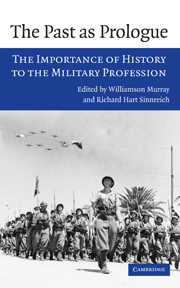Book contents
- Frontmatter
- Contents
- Contributors
- 1 Introduction
- 2 Military history and the history of war
- Part I The influence of history on the military profession
- 3 The relevance of history to the military profession: a British view
- 4 The relevance of history to the military profession: an American Marine's view
- 5 Awkward partners: military history and American military education
- 6 Thoughts on military history and the profession of arms
- Part II The past as illuminator of the future
- Index
5 - Awkward partners: military history and American military education
Published online by Cambridge University Press: 05 June 2012
- Frontmatter
- Contents
- Contributors
- 1 Introduction
- 2 Military history and the history of war
- Part I The influence of history on the military profession
- 3 The relevance of history to the military profession: a British view
- 4 The relevance of history to the military profession: an American Marine's view
- 5 Awkward partners: military history and American military education
- 6 Thoughts on military history and the profession of arms
- Part II The past as illuminator of the future
- Index
Summary
The absence of romance in my history will, I fear, detract somewhat from its interest; but if it be judged useful by those inquirers who desire an exact knowledge of the past as an aid to the interpretation of the future, which in the course of human things must resemble if it does not reflect it, I shall be content.
– Thucydides, The Peloponnesian WarWhen the father of military history penned those words in 431 BC, he introduced a question about the practical utility of historical inquiry that reverberates to the present day: How and to what extent can the study of history usefully inform the man of affairs? The question is especially acute for the professional soldier, for whom the opportunity to practice his or her profession happily is episodic. Unlike other human enterprises in which constant repetition allows for a smooth learning curve, war generally occurs at intervals sufficiently great, and in circumstances so diverse and unrepeatable, that military organizations cannot take for granted the useful transfer of experience from one conflict to the next.
Indeed, despite the conventional accusation that militaries invariably prepare to refight the last war, closer examination suggests they are prone more often to ignore history, or at best recall it carelessly, if not disingenuously. That has been the more true during the past half-century of rapid technological change, during which the recurring tendency has been to discount the relevance of the past altogether.
- Type
- Chapter
- Information
- The Past as PrologueThe Importance of History to the Military Profession, pp. 55 - 77Publisher: Cambridge University PressPrint publication year: 2006
- 1
- Cited by



